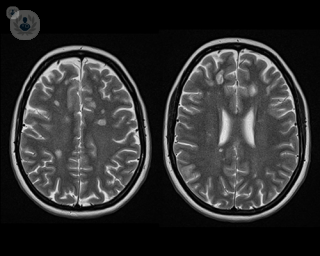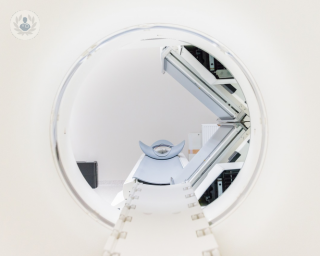Multiple sclerosis
Mr Jonathan Hyam - Neurosurgery
Created on: 01-16-2013
Updated on: 06-12-2023
Edited by: Sophie Kennedy
What is multiple sclerosis?
Multiple sclerosis (MS) is an autoimmune condition, in which the immune system mistakenly attacks the insulating layer of myelin around the nerves in the brain and spine. It disrupts the nervous system, meaning that the messages sent to and from the brain via electrical impulses may not reach their destination. This can lead to all sorts of unpleasant symptoms, such as problems with sensation, balance, arm or leg movement, vision, and general control of your body.
Multiple sclerosis is usually diagnosed in patients in their twenties and thirties, and it affects more women than men. Once MS develops, the patient will have it for the rest of their life, and it can seriously affect their ability to move, sometimes causing serious disability. In more uncommon cases, the condition may only be mild. While there is no cure, it is possible to treat the symptoms, and, in many cases, improve the patient’s quality of life.
There are 2 general types of MS: a progressive variety that slowly gets worse, and a relapsing variety that tends to strike as intermittent attacks.
- Primary progressive MS: in less common cases, the patient’s condition is continual, with symptoms gradually worsening over many years. Sometimes it may appear to stabilise, but will never appear to be in remission.
- Relapsing-remitting MS: in the more common variety, the patient experiences episodes where the symptoms strike, worsen over a few days, perhaps with new symptoms appearing, and last for anywhere from days to months, before slowly improving over a similar length of time. Some symptoms may persist, but often they disappear altogether for a period, perhaps even for years, before the next attack.
- Secondary progressive MS: Relapsing-remitting MS may develop into progressive MS years later.

What are the symptoms of multiple sclerosis?
There are many possible symptoms, depending on the patient, the stage of the disease, and which nerve fibres have been affected by the MS. Symptoms can vary depending on the location and magnitude of each attack. Episodes may vary in length, lasting for days, weeks or months. Attacks are followed by remissions, which are periods during which symptoms lessen or disappear.
Symptoms can include:
- Neuromuscular symptoms: muscle spasms, loss of balance, tremor, weakness
- Urinary and gastrointestinal symptoms: constipation, difficulty starting to urinate, frequent need to urinate, urinary incontinence
- Eye symptoms: double vision, eye discomfort, loss of vision
- Numbness, tingling or pain: muscle spasms, facial pain, itching or tingling sensation
- Brain and neurological symptoms: depression, hypoacusis, dizziness, reduced attention, memory loss
- Sexual symptoms: erectile dysfunction, vaginal dryness
- Speech and swallowing symptoms: poor articulation, chewing problems
Testing for multiple sclerosis
Diagnosis of the multiple sclerosis is not straightforward; several diseases must be ruled out before reaching a firm diagnosis. The most common tests performed are:
- laboratory tests
- brain MRI
- lumbar puncture
- evoked potential tests
What causes multiple sclerosis?
The symptoms of MS result from the damage and scarring to the myelin sheath that surround the nerves in the spine or brain after it has been attacked and broken down by the body’s own immune system. The exact reason why the immune system turns on the body in such a way is not fully understood. It is believed that genetic factors make certain people predisposed to developing it, but that the trigger is environmental.
Can it be prevented?
Given that the cause of the disease is unknown, we do not yet know a way to prevent it. However, medical specialists believe that regular sun exposure may help to control one of the factors linked to development of the disease, namely vitamin D deficit.
How is multiple sclerosis treated?
There is no cure for MS, but treatment can help to keep the condition under control. The type of treatment depends on the symptom.
Short courses of steroids may be used to speed up recovery from relapses, while disease-modifying therapies could reduce the number of relapses, but unfortunately, there is nothing to be done to slow down progressive MS. Research is ongoing, and in the future there may be hope for more effective treatment.

















